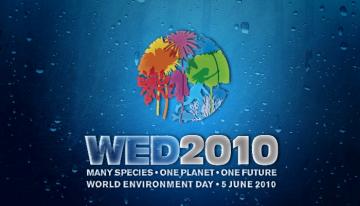
Executive Secretary of the Economic and Social Commission for Western Asia (ESCWA) Bader AlDafa reviewed anticipated impacts of climate change on the Arab region and the steps taken by its countries to control them. AlDafa was speaking on the occasion of the World Environment Day (WED) that was celebrated on 2 June at the Lebanese Lawyers Syndicate in Beirut. Addressing a large crowd of senior officials and participants, notably Lebanese Minister of Environment Muhammad Rahhal and Head of the Parliamentary Committee on Environment Marwan Hamade, AlDafa noted the coordination between ESCWA and Lebanese Ministry of Environment to address these issues, and warned that “should the increase in global temperatures exceed 2.5 percent it is likely that 20 to 30 percent of fauna and flora become extinct”. The UN this year gave WED the slogan “Many Species, One Planet, One Future”, as its celebration coincides with the 2010 International Year of Biodiversity. Through this year, the UN aims to boost awareness about the importance of preserving biodiversity and its relevance to achieving sustainable development and the Millennium Development Goals. In this vein, AlDafa turned to challenges facing biodiversity in the Arab region and particularly the unsustainable exploitation of natural resources and ecosystems, and such unsustainable practices as excessive grazing and poaching. Rapid population growth and the agricultural and industrial expansion add to these challenges. “These factors lead to a decrease of water resources, a deterioration in their quality, an increase of drought areas, more desertification, land degradation, rising sea levels and many other negative effects”, AlDafa affirmed. The ES also said Arab countries are seeking to ward off the dangers of climate change and its impact on the environment by complying with the Convention on Biological Diversity, the Convention on International Trade in Endangered Species, the Ramsar Convention on Wetlands, and others. He added that these countries have developed strategies and national plans of action to preserve this diversity and the protection of ecosystems, pointing out to the increase in “the total number of Arab protected areas from 174 in 1970 to 360 in 2007”. ESCWA had formed a technical committee with the Lebanese Ministry of Environment to set priorities in dealing with issues such as adaptation to the impacts of climate change, air pollution and solid waste management, and to promote environmentally friendly products and other important topics. The Regional Committee is implementing a number of supportive activities for coping with the expected impacts of climate change on various sectors in the region. It also contributed to the development of the general framework of a draft Arab Plan of Action on climate change, which included a number of work programs in the areas of reducing greenhouse gas emissions and adaptation to the potential impacts.





